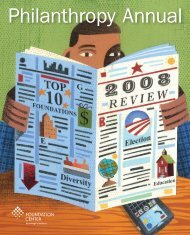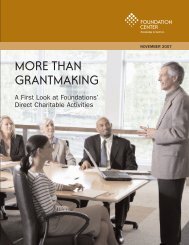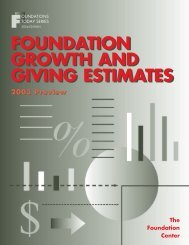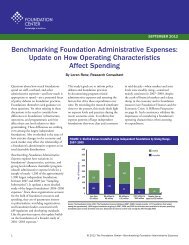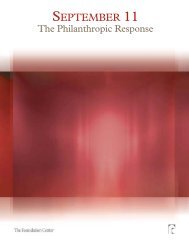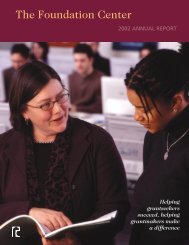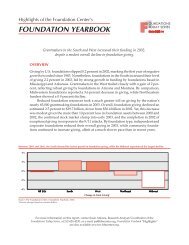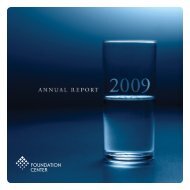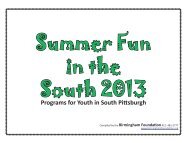Download Philanthropy Annual PDF - Foundation Center
Download Philanthropy Annual PDF - Foundation Center
Download Philanthropy Annual PDF - Foundation Center
You also want an ePaper? Increase the reach of your titles
YUMPU automatically turns print PDFs into web optimized ePapers that Google loves.
For More Commentary & Opinion visit<br />
http://foundationcenter.org/pnd/commentary/<br />
GO<br />
Forget about the tools for a minute<br />
and look at the core principles behind<br />
social media: collaboration, openness,<br />
transparency, timeliness, sharing work in<br />
progress, embracing and learning from<br />
failure. Then think about how we traditionally<br />
operate as foundations.<br />
We could clearly benefit from adopting<br />
some of the practices of the Wikipedia<br />
world, where input is invited from<br />
a much broader and diverse audience<br />
and the knowledge is being gathered<br />
in an open and participatory manner.<br />
Why? Because if we have the courage<br />
to embrace social media principles to<br />
break open and speed up our traditionally<br />
closed and limited grantmaking<br />
model, we can produce stronger, more<br />
grounded, innovative, and effective solutions.<br />
Isn’t that what we want more than<br />
anything — to make a difference on the<br />
issues that we care about so deeply?<br />
They seemed like a good group of<br />
people at this workshop, except for the<br />
guy in the back with yellow eyes and<br />
a raven on his shoulder. I took a deep<br />
breath, hitched up my pants, and offered<br />
them three reasons to welcome social<br />
media on board.<br />
Better Listeners<br />
A program officer mentioned to me<br />
recently that he didn’t think he could<br />
be effective at his job if he didn’t follow<br />
the blogs, Twitter buzz, and other online<br />
conversation in his area of interest. He<br />
didn’t see that as extra work. He saw it as<br />
a better way to stay informed. If we can<br />
get past the idea that social media is just<br />
one more thing to do, one more thing to<br />
learn, we will see that these tools can help<br />
us do what we are already doing — only<br />
more effectively. At the Robert Wood<br />
Johnson <strong>Foundation</strong> we use many of<br />
these tools to “listen” to what is being said<br />
about us, our senior staff, and our grantees.<br />
We also try to monitor what is being<br />
said on the issues we are working on.<br />
Why? Because we are vainer and more<br />
self-centered than a Hollywood celebrity?<br />
No. Because we want to understand how<br />
our work is being received and because<br />
we want to join the conversation. Both<br />
will help us have more impact.<br />
Better Partners<br />
In the traditional world of foundations,<br />
communication tends to be one-way.<br />
We tell the world what we plan to fund.<br />
We tell the world who has received our<br />
funding. We share what we are learning in<br />
the form of briefings and publications. All<br />
good things, but all focused on broadcasting<br />
our message to the universe. In the<br />
world of social media, you put down the<br />
megaphone and hold a conversation. I<br />
heard a senior executive involved in social<br />
media at Starbucks say recently that what<br />
works best are things the company can do<br />
together with its customers. I think that<br />
principle can work well for foundations<br />
also. Building partnerships is something<br />
we’ve always done. Using these tools to<br />
broaden those partnerships and harness the<br />
power created by the resulting networks<br />
can only make us better at what we do.<br />
Better Agents of Change<br />
Last May, the Maine Health Access<br />
<strong>Foundation</strong> posted letters of inquiry on<br />
Facebook. It wanted applicants to its<br />
Fund for the Future to get broad input<br />
from the field before they submitted<br />
their proposals. Program officer Len<br />
Bartel knew that input from the community<br />
would make the final proposals<br />
stronger. The for-profit and academic<br />
worlds boast many examples of tapping<br />
into the wisdom of the crowd to make<br />
their products and their research better.<br />
The foundation world has a<br />
growing number of examples<br />
as well. The Packard <strong>Foundation</strong> has<br />
used wikis to get broader input into<br />
its work on nitrogen and reproductive<br />
health. RWJF and other foundations<br />
have been working with Changemakers<br />
and Idea Crossing to experiment<br />
with new ways of generating ideas.<br />
The Rockefeller <strong>Foundation</strong> is helping<br />
nonprofits tap into InnoCentive’s global<br />
network of problem solvers. And the<br />
Case <strong>Foundation</strong> is involving everyday<br />
…In the world of social media,<br />
you put down the megaphone and<br />
hold a conversation…<br />
citizens in the process. Those are just a<br />
few examples.<br />
If we want to make a difference, it<br />
is time to tear down the walls that have<br />
traditionally existed between us and our<br />
grantees. Between us and “the field.” It is<br />
time to begin to open our closed grantmaking<br />
process to the world. Time to<br />
let a broader audience provide input at<br />
a much earlier point in the process and<br />
all the way through the evaluation phase.<br />
Social media can help us do that. Social<br />
media can help us have more impact.<br />
How did I do with the group in<br />
the workshop? No one came at me<br />
with a sharp object. We all drank too<br />
much wine together afterward, even the<br />
guy with the raven (the bird liked the<br />
merlot), and talked about the challenges<br />
ahead. Did I convince them? Maybe a<br />
little. Did I convince you? You tell me.<br />
We’re in this together.<br />
At the time of this writing, Larry Blumenthal was<br />
director of social media strategy for the Robert<br />
Wood Johnson <strong>Foundation</strong>. He now heads Open<br />
Road Advisors and blogs and tweets regularly<br />
about philanthropy and social media.<br />
People Who Make a Difference | 51



